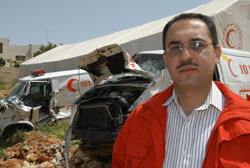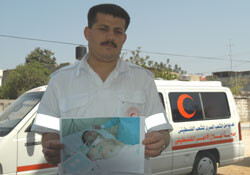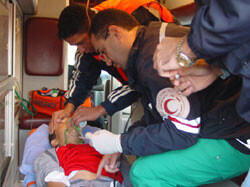International Federation of Red Cross and Red Crescent Societies (IFRC) 26 June 2003

Helping those injured in the conflict put a massive strain on Mohammad Awad’s home life (Photo: IFRC, 2003)
The work of the Palestinian Red Crescent Society (PRCS) Emergency Medical Team is dangerous. Saving lives can have fatal consequences. During the second Intifada three rescue workers have died and 192 have been wounded.
For Mohammad F. Awad, the conflict between Israeli forces and Palestinians reached a sad climax in March 2002. At that energy-sapping time, he was on duty around the clock, going in his ambulance to the frontline of the conflict.
He learned what fear is, when the helicopters started to attack. He knew the sound of exploding rockets, the hate and sadness in people�s eyes.
Those weeks and months became a waking nightmare for Mohammed. He could not sleep at night. Neither could his wife, who worried constantly about her husband.
And there was good reason to worry. His ambulance once came under heavy gunfire. By mistake, he was reported dead. His mother collapsed on hearing the news; his wife was I a state of shock � the couple had got married only a few months earlier.
He reached home unharmed, where he was greeted with petrified faces. �I put myself in the position of my family and asked myself: Is my job really worth it,� the 33-year-old aid worker says.
After that, Mohammad�s job became harder and harder. He will never forget the day he had to collect severed body parts after a rocket attack. On another occasion, a house blew up as someone tried to make a bomb there. Under the victims were two children. One of them, a small girl, died as Mohammed carried her to the ambulance.
“I held the dead child in my arms and asked myself: why does all this happens? How is it possible for someone to have no respect for life at all, making a bomb as his own niece and nephew played next to him?”
As the Intifada - the Palestinian uprising - intensified, Red Crescent members built field hospitals, with the aim of bringing aid and support directly to the people in need. The wounded received treatment close to the fighting, out-patients trying to get to hospital no longer had to vainly wait for hours at checkpoints.

Mohammed Ghazi Al-Hissi is back at work as a PRCS ambulancemen in Gaza City, despite being badly wounded by shrapnel (Photo: IFRC, 2003)
“Putting the sadness into words was so painful,” he explains. Every day he was eating less, he gradually removed himself from his family and his friends. His marriage was in crisis.
Mohammad recognised that things could not carry on like this, but he did not know what to do. “I couldn�t run away from my Red Crescent duties. But I did not want to lose my family,” he says.
He recognized he had to begin distancing himself from work, without having a guilty conscience.
“Seeing my wife as much as possible was a first important step,” he explains. “Whenever possible, we would have lunch together during my break, so I could show her how important my family is to me, especially since I became a father myself,” Mohammad explains.
And he now receives additional help from the PRCS, through a service, financed and supported by German Red Cross and the humanitarian aid office of the European Union (ECHO), that offers stress management and mental health support to the ambulance teams and their families.
�Even if the conflict has calmed down compared to 2002, psychological support is still necessary. Sixty-nine per cent of our emergency teams have been wounded at least once,� explains Dr. Mohamed Mandour, who is in charge of the stress management programme, through which social workers and psychologists offers help to the 580 PRCS staff and volunteers and their families in all 14 districts.

Now, the members of PRCS ambulance teams can benefit from a stress management programme. The pressure comes not only from what they witness in their work, but also the expectations of the population (Photo: IFRC, 2003)
�Our team has to face enormous pressure. Not only because they carry out a dangerous task. Society and their community expect a great deal from them, while on the other hand, their families do not know how to handle their fear,� he adds.
Many times Emergency Medical Teams are asked for a lift in the ambulances from people hoping to get through checkpoints to see friends and family. The PRCS teams have to refuse.
�The EMS personnel often have to confront their own powerlessness, when the armed forces refuse to allow an ambulance carrying a patient through a checkpoint. Powerlessness can hurt,� Mandour says.
Today, Mohamed Awad is a trainer for Emergency Medical personnel. Every day he looks in the faces of the young Red Crescent members, hoping they will not meet the same fate as Mohammed Ghazi Al-Hissi. The ambulance driver was wounded in a rocket attack while on duty in March 2002.
The physical scars are still there � he can still only move his arm painfully. Even so, like so many wounded in the conflict, the 28-year-old is still on duty in Gaza City.
But not all of the scars are visible. And those wounds are often the deepest.
Related Links:

